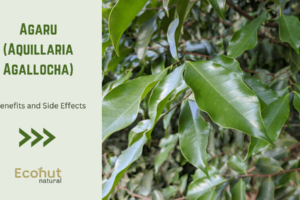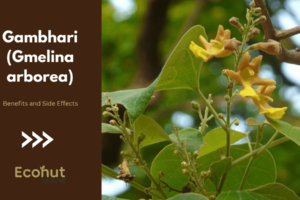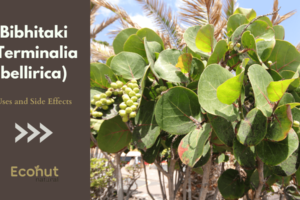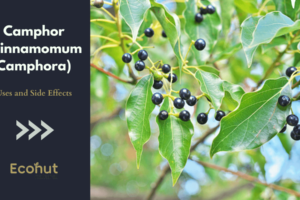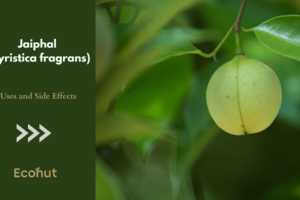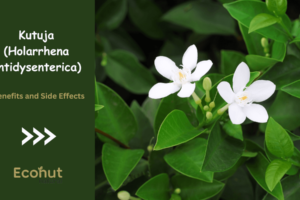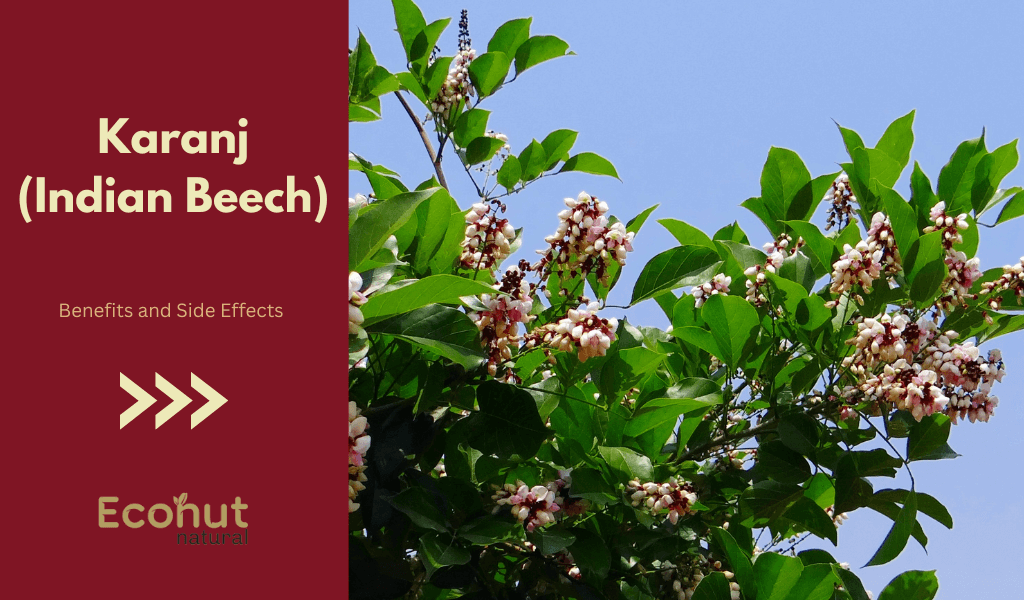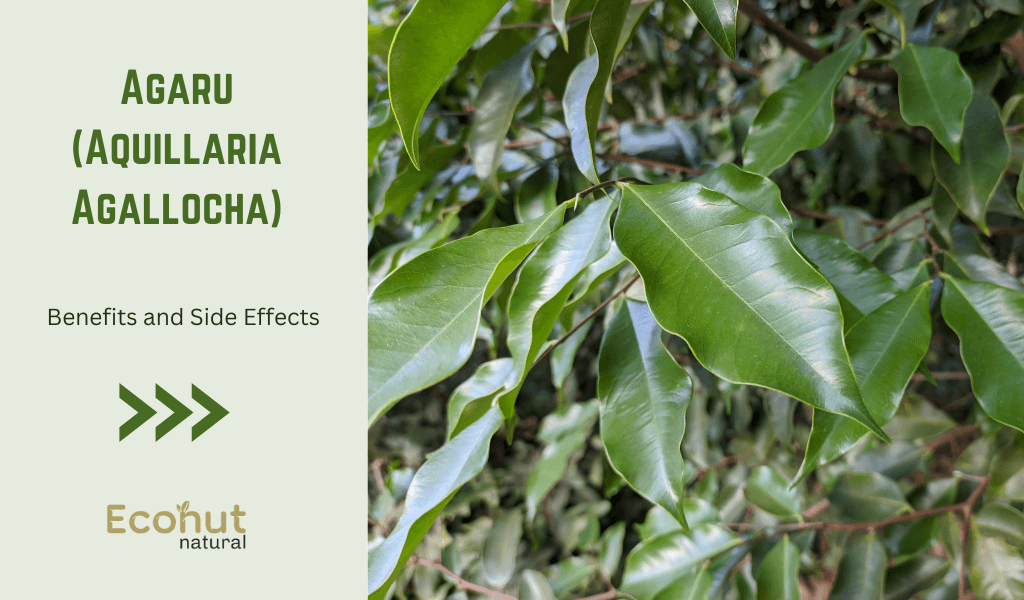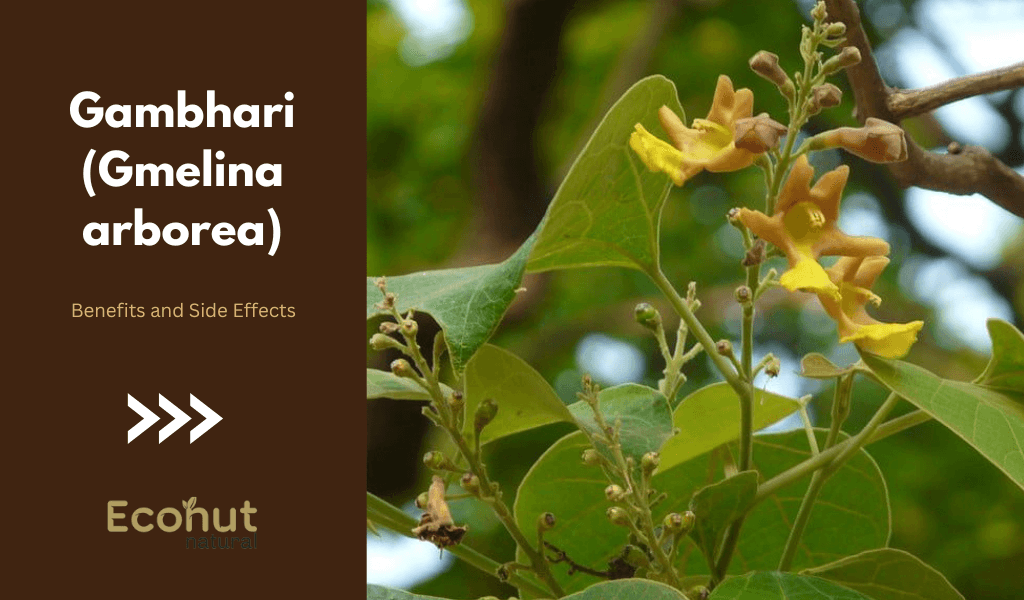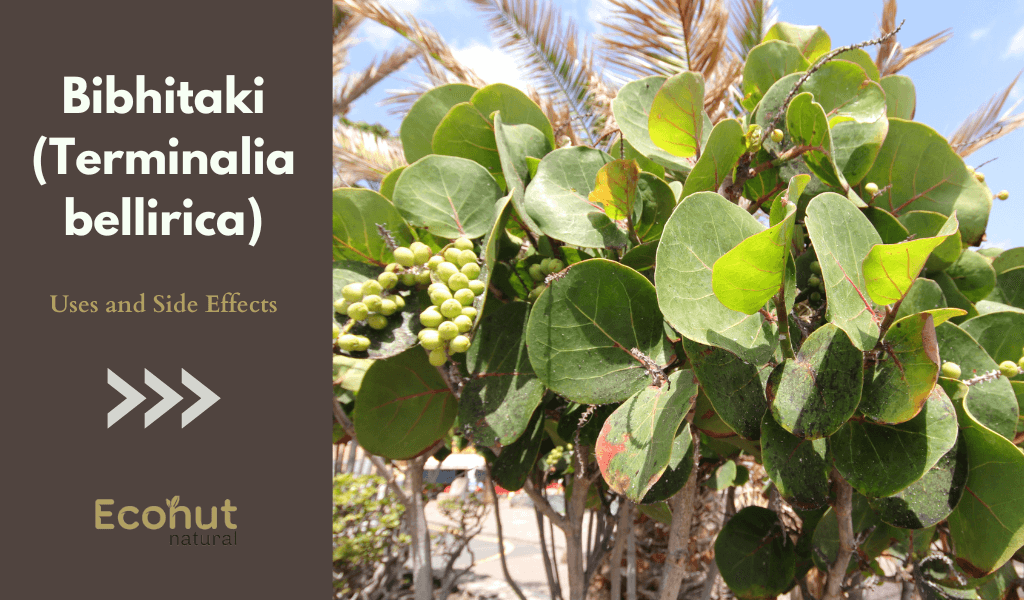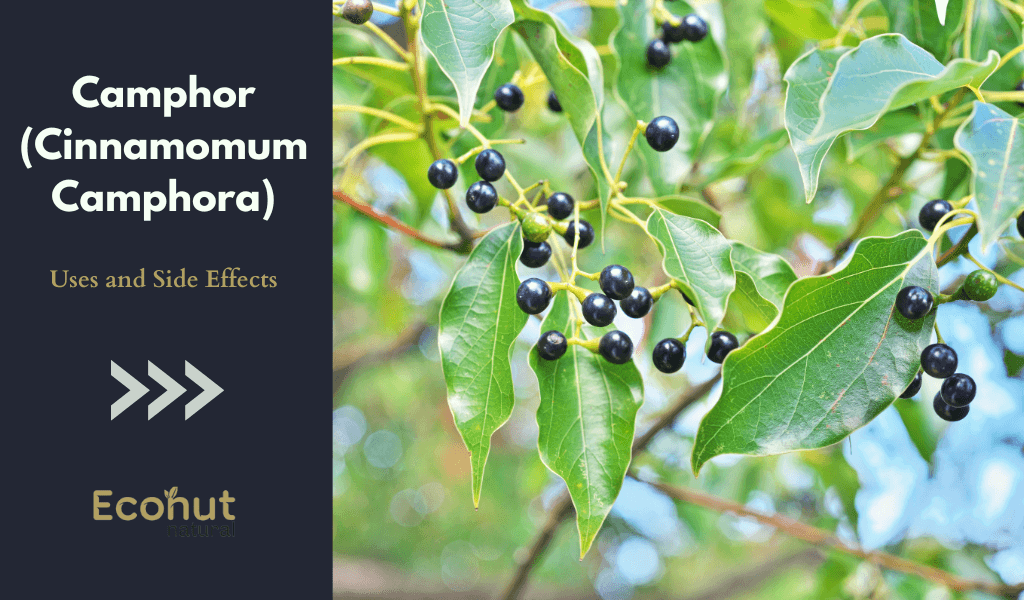Karanj, also known as Indian Beech or Pongamia pinnata, is a tree native to the Indian subcontinent. It belongs to the Fabaceae family and is renowned for its multiple uses in traditional medicine, agriculture, and various industries.
Scientific Classification
| Botanical Name | Pongamia Pinnata |
| Family | Fabaceae |
| Genus | Pongamia |
| Species | P.pinnata |
Description
Karanj, scientifically known as Pongamia pinnata, is a medium to large-sized tree native to the Indian subcontinent.
Physical Appearance:
- The bark of the tree is rough, dark brown to greyish-black in color, and deeply furrowed.
- The leaves are compound, alternate, and pinnate, consisting of 5 to 9 leaflets arranged oppositely.
- Each leaflet is elliptical or lanceolate, with a glossy green upper surface and a lighter green underside.
- Karanj trees typically grow up to 15-25 meters in height, though some specimens can reach heights of up to 30 meters.
- The tree has a broad, spreading canopy with dense foliage, providing ample shade.
- Its trunk is often straight, with a diameter ranging from 50 to 80 centimeters.
Flowers:
- Karanj trees produce small, fragrant flowers that are white to pale pink in color.
- The flowers are arranged in clusters, appearing in abundance during the flowering season, which typically occurs in late winter to early spring.
- These flowers are attractive to pollinators such as bees and butterflies.
Fruit:
- The tree bears oval-shaped fruits, which are initially green and turn brown as they mature.
- Each fruit contains a single seed, which is large, round, and brown in color. The seeds are enclosed in a hard, woody shell.
Habitat:
- Karanj trees are commonly found in a variety of habitats, including tropical and subtropical regions.
- They thrive in well-drained soils, including sandy, loamy, and clayey soils.
- The tree is often found along riverbanks, in coastal areas, and in deciduous forests.
Other Language Name
Hindi: Dithouri
Bengali: Dahar Karanj
Malayalam: Ponnam
Gujarati: Karanj, Kannjhi
Telugu: Pungu
English: Indian Beech
Properties of Karanj (Indian Beech)
- Rasa (Taste): Katu (Pungent), Tikta (Bitter), Kashaya (Astringent)
- Guna (Quality): Laghu (light), Teekshna (sharp)
- Veerya (Potency): Ushna (Hot)
- Vipaka (Post digestive effect): Katu (Pungent)
- Karma (Action): Balances the Vata and Kapha dosha
- Projyang (Part used): Bark, leaves and seeds are used
Benefits of Karanj (Indian Beech)
Karanj, also known as Indian Beech or Pongamia, is a tree native to the Indian subcontinent. Here, we are discuss some of benefits regarding Karanj are below.
Medicinal Resource:
All parts of the Karanj tree, it contains seeds, leaves, and oil, are using in traditional drug for treating a range of ailments such as skin diseases, rheumatism, inflammation, and wounds. The oil extracted from Karanj seeds is particularly valueable for its medicinal properties.
Using In Biofuel Production:
Karanj oil is contain in biofuel properties. By using this herb as a feedstock for biodiesel production, offering a sustainable alternative to fossil fuels. The oil extraction process also yields a byproduct called Karanj cake, which can be used as organic fertilizer or as a component in animal feed.
For Soil Improvement:
This trees include nitrogen-fixing properties, which means they can the enrich soil with nitrogen, an essential nutrient for plant growth. Planting Karanj trees can help improve soil fertility and reduce the need for chemical fertilizers.
Toxicant Properties:
This tree oil contain insecticidal and pesticidal properties, making it useful in organic farming as a natural pesticide. It can help control pests and diseases in crops without the need for harmful chemical pesticides.
Use In Animal Food:
Karanj cake, the byproduct of oil extraction, is nutritious and can be used as a supplement in animal feed. It provides protein and other essential nutrients, contributing to the health and productivity of livestock.
Also Read: Ushira, Vetiver (Vetiveria Zizanioides): Uses, Benefits and Side Effects
Karanj (Indian Beech) Side Effects
Karanj is refered as Indian Beech or Pongamia pinnata, is a tree native to India and other parts of Asia. Other parts of the tree, including the seeds, leaves, and oil extracted from the seeds are used for medicinal purposes. Here, we are discuss some of side effects regarding Karanj (Indian Beech) are below.
Gastrointestinal unhealth:
Consumption of Karanj seeds or oil may cause gastrointestinal unhealth in some people, leading to symptoms such as nausea, vomiting, diarrhea, or stomach pain.
Skin infuriation:
Direct contact with Karanj oil may cause skin irritation or allergic reactions in sensitive individuals. Before using Karanj oil topically and dilute it with a carrier oil to reduce the risk of irritation.
Medicine interactions:
Karanj oil may contact with certain medications, including blood thinners, antiplatelet drugs, and medications metabolized by the liver. If you are taking any medications before using Karanj products it stop otherwise take advise to health provider.
Blood thinning:
Karanj oil include properties that may possess mild blood-thinning. Person who taking blood-thinning drug or with bleeding disorders should use Karanj oil with caution, because it increase the risk of bleeding.
Light Sensitivity:
In some studies suggest that Karanj oil is increase sensitivity to sunlight, it higher risk of skin damage. After use Karanj oil on the skin avoid long time sun exposure.
During Pregnancy and breastfeeding:
Before using Karanj products during pregnancy and breastfeeding take advice to healthcare professional. Otherwise It may be dangerous for your health.
Conclusion
Karanj, is refered Indian Beech, stands as a beacon of sustainability and versatility. Its medicinal properties offer therapeutic benefits, while its seeds provide a potential source of biofuel. With applications ranging from skincare to environmental conservation, Karanj emerges as a valuable asset, embodying the harmony between nature and human innovation.
FAQS
How is Karanj oil used for health purposes?
Karanj oil, extracted from the seeds of the Karanj tree, is used topically for treating skin conditions such as eczema, psoriasis, acne, and fungal infections. It is also used in Ayurvedic medicine for its anti-inflammatory effects and is applied externally to alleviate pain and inflammation in joints and muscles.
Is Karanj beneficial for hair health?
Yes, Karanj oil is believed to have beneficial effects on hair health. It is often used in hair care products due to its moisturizing properties. Massaging Karanj oil into the scalp is believed to nourish the hair follicles, promote hair growth, and help in managing dandruff and scalp infections.

